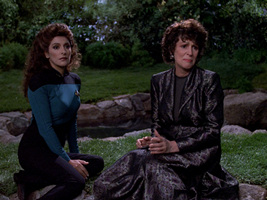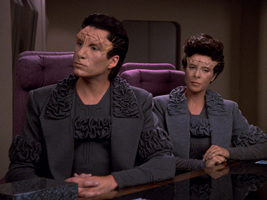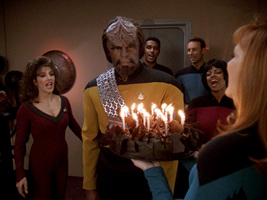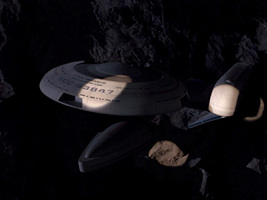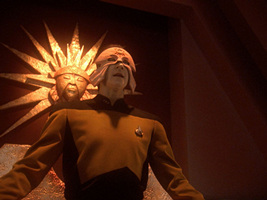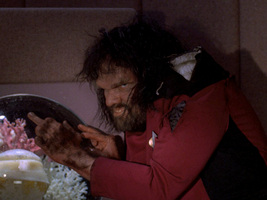The Next Generation (TNG) Season 7 Guest Reviews
Season 1Season 2Season 3Season 4Season 5Season 6Season 7
Gambit I/II
Synopsis
Stardate 47135.2: Synopsis in main TNG listing
Review
I'm actually not THAT much of a fan of this two-parter. Sure the premise is really interesting in that we're thrown into the episode in the midst of the hunt for Picard and later as it's thought, his "killers", but I can't same I'm a fan of the main antagonist. And seeing the focus of the episode highly revolves around Baran, it's just natural of me to watch with little vested interest.
Not to say this is a BAD episode though thanks to Arctus Baran alone, for Picard to be playing in this charade aboard the mercenary ship in helping locate ancient Vulcan artifacts, Riker with his fake turncoat, as well as the scenes aboard the Enterprise, where Data takes command with Worf getting a crash course in being XO (something he learns more of in Deep Space Nine), even to the point of being reprimanded by Data for insubordination (causing Data to perform the Picard manuever). It's really good to see the main characters acting out of place and in such a life or death situation. And Robin Curtis turns in a pretty good (and in my opinion, hot) performance as Tallera, whose also masquerading, a Vulcan isolationist much like those seen "later" in the Enterprise trilogy "The Forge", "Kir'Shara", and "Awakening", albeit with motives more akin to the Vulcan High Command of the era (intolerance of non-Vulcan species).
So basically the plots pretty straightforward, with Baran using the crew to track down these Vulcan artifacts, which, when combined, forms a psionic (telepathic) weapon, which feeds off negative thoughts as its power source. THIN. I'm sorry but for one thing, the small talk invested in the 'Stone of Gol' as it's called makes you think it's some form of doomsday weapon capable of mass destruction. Instead what we have is something looking more at home in a gimp shop no larger than a 23rd century tricorder.
And Baran is also a source of derision of the episode for me, what a loathsome, cowardly individual, I may have been more willing to be more interested in the happenings aboard his ship if the crew were manned by Vulcan isolationists, or at least commanded by one. Not some effeminate alien who looked more at home in an 80's hair metal band that got off torturing his crew into doing his bidding. It only made it more obvious what his fate would be, and even then it's so unfeasible Picard were able to so simply 'change the transponder codes' on his pain inducing device to target Baran instead. I wonder how in the world Jean-Luc was able to get his hands on the device, it's VERY convenient that it's a scene notably omitted.
The culmination of the episode is Tallera unsuccessfully using the weapon on Picard, Riker and Worf, who upon taking a chill pill on Picard's orders, are unsusceptible to the weapon. I found that to be a bit anticlimactic. But the final scene is a real gem, Picard, believed to be dead decides to get some on-hours sleep, whilst Data (of course, still operating under the assumption that he should be charged with among many things whilst he working with Baran, treason, the miserable he-bot), escorts Riker to the brig.
Annotations
- Remarkably BAD performance: The young Ensign who replaces Data at OPS while he's in command, thank goodness she never made a repeat appearance.
- Remarkable scene: The phaser fight in part 1 where Riker was abducted
- Remarkable ship: Baran's pirate ship
Rating: 5 (Cameron)
Dark Page
Synopsis
Stardate 47254.1: Synopsis in main TNG listing
Review
I'll make it quick. God this episode sucked. It's enough to employ the obligatory episode dealing with telepaths from another world aboard the Enterprise causing Deanna to lose it. We are also forced to deal with Lwaxana and some long ago traumatic incident of hers, the revelation being she and her husband had another daughter who died tragically. Like anyone really cares though, I'm not even sure enough people liked Lwaxana who never came off as remotely likeable maybe with the exception of "Cost of Living", so it's naturally a hard thing to ask to sympathise with her over some event that no one knew about, least of all Deanna.
This gets 2 stars, and that's being generous, 1 for Marina Sirtis looking AMAZING and 1 for the novelty value of a very, very young Kirsten Dunst appearing.
Annotations
- Remarkable feat of endurance: Me actually bothering to watch this in its entirety.
Rating: 2 (Cameron)
Force of Nature
Synopsis
Stardate not given: Synopsis in main TNG listing
Review
At the time of its release I thought this was a bold if not brave direction Star Trek was taking.
The story is once again the search for a missing starship, running into the usual enemy, assuming its them, B-plot that is there just for humour (Data and Spot this time), and the usual conclusion.
The twist here however is that a piece of technology that the Federation uses is causing harm - and that is the famous warp drive; and said propulsion system is ripping up space and causing environmental disasters. Think the Combustion engine and the Carbon footprint and you get the idea of the motive here.
In fact it's a rather interesting thought. Can the quest for space exploration be an environmental hazard? Its a rather mature look into a concept I feel no one has ever bothered to question.
Sadly the entire idea is delivered with incredible chunkiness. The aliens who expose this fact are confrontational, and come in the form of the "Ying Yang" pairing - you know one is passive the other aggressive, and you know the aggressor of the pair is going to do something to prove their point.
Overall the idea is a good one but the snag is that THIS is what makes Star Trek - the warp drive. Aside of the tricorder, the transporter, the phaser and the photon torpedo, the warp drive is the core of Star Trek. To declare it an environmental danger slaps Gene's utopian dream down. In addition to replace the system, would mean no more warp nacelle designed ships that we all know.
The final fact is that other drives are explored but have "faults" and that this idea is later shelved shows that the warp drive is here to stay and thus ruins the credibility of this entire episode.
Shame.
4/10 for a good idea, but delivered badly.
Annotations
- Remarkable continuity and flaw: This was the first Star Trek episode where the maximum warp speed limits were imposed by the Federation on all Starfleet vessels. Further references were made in "The Pegasus" and "Eye of the Beholder" later in the season. According to the unpublished VOY Season 1 edition of the Star Trek: Voyager Technical Guide, by Rick Sternbach and Michael Okuda, it was suggested that because of the variable geometry pylons, warp fields may no longer have a negative impact on habitable worlds as established in this episode. So does this mean the Enterprise-E pollutes with its static pylon assemblies?
- Remarkable honesty: The production staff were unanimously disappointed with this episode. Michael Piller remarked, "I think this is the worst show I collaborated on this season. It certainly inspired us to have several meetings on where the season was going because I felt we were letting it slip away." Yet despite this, the franchise would continue to slip and slip.
- Remarkable admittance: Brannon Braga on the episode's premise "When you limit warp drive, the rug is being pulled out from under Star Trek. I wish more time had been spent with that, and less time with Spot and cat."
- Remarkable fact: Jeri Taylor cited that the reason this episode failed was that it tried to do an environmental story but also a personal one, yet in the mix, they all got lost and the end result was a mess.
Rating: 4 (Chris S)
Parallels
Synopsis
Stardate 47391.2: After attending a Klingon bat'leth tournament, Worf starts noticing subtle changes to the Enterprise and the goings-on aboard. This reaches a head when his momentary dizziness during a change gets Geordi killed, and subsequently he finds that he is now married to Deanna. After finding out that Geordi's VISOR was the cause of the changes, and that Worf is indeed slipping between different "quantum universes", the crew must find a quantum fissure that will help restore Worf to his natural universe. However, an attack by the Bajorans (who, in this universe, have overthrown the Cardassian empire) throws the plan into chaos, with thousands of Enterprises from other universes appearing. When Worf enters the fissure in the shuttlecraft Curie, however, things return to normal, back when Worf was returning from the bat'leth tournament.
Review
This is a remarkable episode, but frankly I didn't realise it the first time I watched. I've always loved episodes showing alternate realities and futures, such as TNG: "Yesterday's Enterprise" and VOY: "Timeless", to name a few, and this one seemed to slip by me.
It has a very nice mix of humour and suspense, although I still find one of the funniest parts of the episode to be Worf saying "But.. the cake was chocolate!", almost like he's disappointed. Another would have to be Michael Dorn's wonderful acting after Troi points out that, if she were to be Alexander's Soh-chim, Lwaxana Troi would then be his stepmother. And, of course, Worf finding out that Troi and he are married.
The technobabble of this episode didn't thrill me. The concept that they can just "seal the fissure" and everything will go back to normal doesn't seem all that credible, but then again, I'm not a temporal theorist.
Troi and Worf's relationship in the alternate universe is touching, to say the least. Worf telling Troi that he's never ruled out a romantic relationship with her is probably the nicest thing he ever said (up until some DS9 episodes with Dax).
As always with TNG, I would liked to have seen a bigger variance in the special effects; I doubt all the Enterprises from all those universes would look exactly the same on the outside (especially the one from the Borg-infested universe). There are subtle differences like the colour of Data's eyes and Data's painting which suitably notify us we're somewhere different, without spelling it out to us.
I like this episode most of all, however, because it's finally a GOOD episode focused on Worf. There are very few of these in TNG, and not that many after season 4 of DS9. It gave Michael Dorn a good chance to act more than the lumbering oaf whose job it was to spout the word "Honour", and to disagree with everyone.
Annotations
- Remarkable scenes:
- Thousands of Enterprises appearing around the fissure.
- Worf's surprise party.
- Remarkable dialogues:
- "And then we mated." - "I am not privy to the exact details of when and where your initial coupling took place. I could investigate-" - "No." (Worf and Data)
- "That would make my mother... your stepmother." - "I had not considered that! ... It is a risk I am willing to take." (Troi and Worf on Lwaxana being his stepmother)
- Remarkable facts: In the alternate universe, the bars on the com badge denote rank, just as the pips do. There is a Cardassian helmsman in the alternate universe. This is the first episode to hint that Troi and Worf might have a romantic entanglement in later episodes.
- Remarkable guest star: Wil Wheaton as Lieutenant Wesley Crusher
Rating: 10 (Hon. David Kulessa)
Parallels
Synopsis
Stardate not given: Synopsis in main TNG listing
Review
The final season of The Next Generation was very lacklustre, and almost brought Trek back to the bad early days - however the show still could pull it off once in a while. "Parallels" deals with the subject of "alternate realities"; nothing new considering the fact Trek explored this concept ages ago and would do so again in DS9 and ENT - and in an ironic way with J.J. Abrams's ideas. However, unlike the aforementioned, "Parallels" looks at the subject with seriousness and a refreshing maturity that makes this episode a great joy to watch.
The story starts with Worf returning from a tournament and his reluctance; it's his birthday. In an executed series of events, he is wary of the human tradition of surprise birthdays - and as he fears - he gets one. It is here that the troubles begin.
Like with the best episodes, it again treats the viewer with maturity and respect, and carries you along to figure out what is going on - from the type of cake "it was chocolate" to the incidents with Deanna (quite humorous) tending his hair, to the failing of his duties on the bridge when tactical requirements are needed. The moment comes to pass when he reviews his logs about the tournament he had returned from - and instead of winning, he did not.
Of course the crew and he figure out the cause with inadvertently lead to a Special Effects Treat!
What I love about this episode is that it has humour, mystery, curiosity and like with TNG Ep "Frames of Mind", "The Inner Light", "Future Imperfect", and "Clues", it warrants audience participation to figure out what is going on, surprise us, and respects the watchers.
Worf is the perfect foil here - he is no scientifically minded, making his surprises and perplexity more convincing when he keeps facing events that are beyond his reasoning - and ours as well. Had it been Data, Geordi, or Picard, their skills would have sussed out the problem ages ago; it could have worked with Beverly, maybe Riker and Deanna, but the comedic elements may not have been so great.
It also treats the subject of alternate realities as a scientific plausibility and not a cheap gimmick to tell stupid stories that brings our heroes to death only for the re-do button to kick in or to come up with daft ideas for sake - or worse creating a different place that is a pantomime - and yes I am having a go at that reality.
Brilliant! 10/10
Annotations
- Remarkable scenes:
- The sudden appearances of thousands and thousands of alternate Enterprises
- The thousands and thousands of different Worfs that stride the shuttle
- Remarkable quote: "That Cake - I thought it was chocolate!" Have to hear Worf say it :)
- Remarkable scene: When Worf enters his room and Deanna does not leave, and then she stroking his hair!
- Remarkable fact: Worf and Deanna's relationship was born from this story and was allowed to expand in the "prime universe"; however, many people just did not like the idea.
Rating: 10 (Chris S)
The Pegasus
Synopsis
Stardate 47457.1: Cmdr. Riker is required to do some major soul-searching when his former CO, Admiral Eric Pressman comes to the Enterprise, searching for their lost ship Pegasus. Romulans have also joined the search for the missing ship, but not in the spirit of co-operation. The Enterprise locates the Pegasus partly materialised in solid rock inside a deep asteroid chasm. Pegasus is discovered to be carrying a prototype phasing cloak, which is recovered and used to rescue Enterprise from the asteroid after the Romulans seal the Enterprise inside. Capt. Picard reveals the cloak to the Romulans, with Pressman and Riker being led off the bridge under arrest for violation of the Treaty of Algeron. Picard later releases Riker from the brig.
Review
This episode definitely ranks among the better episodes. It does a number of things: 1) It delves into a character's pre-show history. 2) It shows a slightly darker tone to certain elements of Starfleet (which would almost be required in as large a quasi-military organisation as Starfleet). 3) It presents a dilemma for Riker we only see superbly done on rare occasions.
I find the concept of the phasing cloak a little hard to swallow for a group that is bound by treaty from developing cloaking technology at all. To shield from detection is one thing. We have seen this done several times in various episodes with Federation craft. But to shift the quantum state of matter so it may PASS THROUGH normal matter is another thing entirely, particularly since we saw in "The Next Phase" that even Romulans had some issues with a phasing cloak. So how could someone comparatively new to the technology develop a more advanced version. Of course, since the Defiant has a working cloak, this technology isn't COMPLETELY untested to Federation engineers.
Pressman seems 'slimy' from the start, which is a fairly obvious sign that he isn't a good admiral (as there seem to be the GOOD admirals and the EVIL admirals). I think some effort could have been made to either have Pressman be more sympathetic or at least less obviously slimy.
A positive note to this episode is the verbal sparring between Picard and the Romulan captain Sirol. The double talk is amusing and it is also fairly believable.
Overall, I like the episode for the mental dilemmas that are placed on the characters. The conflicts that present to the characters are dealt with in a reasonably mature fashion as we ought to expect from Star Trek.
Annotations
- Notable fact: It is Riker's problem of revealing the phasing cloak that is the focus of ENT: "These Are The Voyages".
- Uncertain detail: We aren't sure where the Devlin system IS, but it must be outside regular Federation space. The Romulan Warbird decloaks and nothing is mentions about being a violation of the Neutral Zone. Using Bernd's conjectural galactic map, I would place the Devlin system towards the northern edge of explored space a little beyond where Federation space and Romulan space end.
- Nitpicking: When Riker is in the brig, Picard enters the code to deactivate the security field. The field destabilises and collapses before Picard is finished entering the code.
Rating: 7 (Brian Hunter)
The Pegasus
Synopsis
Stardate not given: Synopsis in main TNG listing
Review
What starts as an innocent episode, rises into a thriller only for it to fall apart at the end.
The Captain Picard Day is a good chuckle - why kids find this man a "hero" is hard to imagine - okay, he may have saved the ship from numerous catastrophes, but his manner is that of a headmaster, but hey maybe it's all different. Or the parents encouraged them.
Matters take an interesting turn when Picard is given another covert mission/rendezvous with another starship on a top secret mission. When they do make contact, the specialist is an Admiral Pressman, and more interestingly, the mentor of Riker.
Riker has always been one of the lesser characters in TNG since its inception - he was intended to be the Kirk of the crew - i.e. bedhopping, kick-ups, and spearheading away missions. However, plans change and the character has been nothing more than a supporting crotch to Picard and a bloke who gets either funny or upset. Here we see why Riker was selected, how he started out in Starfleet, and that he too has a flawed past.
The story concerning the Pegasus is a clever one and answers a question that has plagued all who watch Star Trek why the Federation never built or looked into cloaking technology: not cobbler technological reasons but a declaration - the Treaty of Algeron. The clash of authorities is also well explored - the primary fundamental (and it should be) is the safety of the ship and crew - not the leadership (this later disguarded with gratuitous effect in Voyager and DS9) - and that the laws that govern the Federation are to be upheld and not perverted for ANY reason.
Where it falls apart is the Pegasus's technology - a cloaking device that can also make vehicles move through solid matter. Not only can you become invisible by a technology never well explained, but now its also possible to go through walls! This is utter, utter rubbish - might as well class the Enterprise as a Ghost! The merged Pegasus is also utterly stupid - I mean where does the rest of its hull go? Such an effect would cause some sort of reaction, not just become rock! This is lazy technology with no consequence. It is this rubbish over the top, ridiculous idea that ruins to me a good story.
Then again it was done by Moore Ron. Shame.
Annotations
- Remarkable scene: The Enterprise inside the Asteroid. Floodlights galore.
- Remarkable facts:
- Ron D. Moore based this episode on Raise the Titanic, that behind the recovery mission, there was something else afoot.
- Alas this episode would be part of the ENT finale atrocity "These Are The Voyages".
- The original Pegasus was to have been a Cheyenne class, but due to budget reasons they once again used the Oberth class. ALL that money and this is the best they can some up with?
- This is the first Star Trek episode since "The Enterprise Incident" in which the Enterprise is using a cloaking device. The episode finally provides a canon explanation for why the Federation doesn't use these devices. Moore stated, "I thought, let's sew this up, not because it's the last season but because I'm sick of that question at the conventions!". He believed the treaty was the easiest explanation, and better than those offered in the past - that the cloaking device harmed humans, that the device wouldn't work on Federation starships, or that "we don't sneak around". Sometime the simplest explanation is the best.
Rating: 6 (Chris S)
Masks
Synopsis
Stardate 47615.2: Synopsis in main TNG listing
Review
Oh good grief. It took me about 40 seconds to realise the hell I'd be in for while watching the opening teaser for this episode, needless to say the laughter 'masking' the groans set in quickly, so I made the excuse to do some chores before coming back to show.
I had seen it before however and well, you at least have to be happy with Brent Spiner's multiple performance. Yes it is quite comical at times, but some credit at least should be given for the versatility displayed.
BUT, that certainly doesn't save the episode from being a blight on the series and a good indicator that 7 seasons was maybe 1 season too many for an excellent show otherwise. And wow, what a waste "Masks" looks to be at that, the large set being Goddess "Masaka's" temple isn't that bad, and the constant reworking of the Enterprise itself, slowly transforming the ship into a jungle, it's a shame that so much effort was put into what became a very poor episode.
The plot is well, to be honest I found it incomprehensible, Picard's first action that led to the whole mess for instance. A beam from an ancient (and obviously superior in power) connects with the Enterprise's computer, and he doesn't sever it? Moving on, the manifestation of the various 'Deities' inside Data was also incredibly stupid. I may be correct in understand HOW it all worked, scriptures or whatever about the Gods in the society were downloaded into Data, but his taking on their personas and ugh... ok, plausible or not, it was still unsatisfactory to watch. And the naivety of Picard, taking him about 3/4's of the episode to realise the roles of Masaka and Korganowere like the Sun and moon despite other obvious allegories, pictures for instance, the meaning of the 'chase' between the pair. You really felt like smacking him on the head for that one. And yes... his donning the mask of Korgano and pretending to be him, nearly seducing Masaka (ie. Data) into relinquishing power and yeah, everything's wrapped up with no long term consequence but Data having the experience of not only the Gods in his head, but apparently the entire culture who worshipped them. Big whoop.
Annotations
- Remarkably awkward prop: The giant Phallus that appears in Troi's quarters that she and Beverly fawn over, hilarious. Not too mention in Picard's quarters he handles the same "object" much to the delight of Riker (Frakes clearly trying to hide his laughter).
- Remarkable set: Masaka's temple
- Remarkable fact: At a Creation Entertainment convention in 1997, Michael Dorn cited this as his least favorite episode of TNG.
Rating: 2 (Cameron)
Genesis
Synopsis
Stardate 47653.2: Synopsis in main TNG listing
Review
I was always a bit hesitant to give this one a watch, the premise of the crew turning into monsters always seemed kind of gimicky and well, we ALL know how good Brannon Braga is when penning an episode dealing with such a premise... uhh... right?
Ok thought not, but I gave it a chance and wasn't disappointed. The subtle performances by the crew as a prelude to their 'de-volution' was well done. From Riker losing his ability to process complex decisions done to downright simple ones (like doubling security with a rabid Worf on the loose) as he's to become a neanderthal-like creature. Worf becoming more aggressive and animalistic, devouring all sorts of wonderful looking Klingon cuisine, trying to get Troi in the sack. Deanna, who develops an insatiable appetite for caviar and water before turning into some amphibious being. And Alyssa, who's doomed to become a monkey, is spied subtly dragging her knuckles in a conference and becoming more aloof in the movement of her limbs, so some good character acting from most of the actors. Picard as well is slightly amusing, he seems however a little disappointed he's to become a lemur, this leading to his becoming increasingly paranoid and terrified by the creature Worf becomes.
So the plot, well while Picard and Data are retrieving a wayward torpedo from a failed guidance systems test, a virus spreads through the ship. The pair return to discover genetic codes are being activated in the crew causing them to mutate into forms of primitive life on their respective home planets. The science behind this all I found shaky, but it wasn't really of much consequence, and was no worse than the typical miraculous transformation back to normal by the crew in the end.
A cure is discovered though, Spot (now an Iguana... right), had given birth to kittens as she had begun to de-volve, so Data theorises the amniotic fluid in Spot had protected her litter from becoming susceptible from the virus. Using this knowledge, Data harvests amniotic fluid from an ape-like Alyssa, and filters it throughout the ship. While this is happening, Picard is being pursued by a transformed Worf, which was a pretty damn scary set of scenes! The cure works though and in the end everyone's fine, some medical jargon was responsible for the virus, having to do with Barclay, who has the virus named after him. Deanna of course, isn't impressed that she'll have to clear her schedule for the next few weeks to accommodate the nutbag for multiple sessions.
In my mind, quite a good episode, very atmospheric and it's not the sort of genre the Trek franchise handles very often. It reminded me of the Enterprise episode "Impulse", of which I'm a fan.
Annotations
- Remarkable quote: "Before I start... swinging through the ship looking for breakfast, we'd better look for some answers." -Picard, facing the prospect he's to become a lemur or pygmy-marmoset creature
- Remarkable scene: Data and Picard finding the Enterprise adrift
- Remarkable fact: Spot's a hussy! There are 14 male felines on board the Enterprise according to Data, and anyone of them could be father to her litter...
Rating: 7 (Cameron)
Genesis
Synopsis
Stardate not given: Synopsis in main TNG listing
Review
If I had to sum up this episode in two words, it would be "bad science". That's probably the most remarkable thing in the whole episode. It's full of inconsistencies, and it's particularly egregious here because normally all of that would be explained by technobabble that's composed of newly invented words, so nobody would ever question that. However, here it was attempted to explain the "Whole-crew-is-disabled of the Week" plot by using actual scientific terms. For those who are not familiar with them, it would probably pass as technobabble as well, however, since I'm currently studying biology, this is particularly jarring.
So, what are those inconsistencies? First of all, Dr. Crusher giving Barclay T-lymphocytes that would activate a dormant gene. In order to change genes, you need to change their chemical structure by altering them. Lymphocytes have nothing to do with that, they are simply responsible for destroying dangerous or potentially dangerous cells. Secondly, Crusher explains that it would allow Barclay to heal naturally. However, if the disease was something T-lymphocytes could help with, it would be as non-natural as it can be, because in order for the body to synthesise defensive cells by itself, it needs to deal with the disease itself, without any foreign cells helping. Thirdly, how does it become airborne? If it were blood cells, they would be not nearly as light and aerodynamic to float, nor would they ever leave blood to begin with, since cells are too big to pass through the capillaries to be exhaled. It would be more reasonable if it was a virus, and not a cell - in that case it could be airborne and would have the ability to affect DNA, since they are a lot smaller and contain the enzymes needed to change the DNA. However, in that case Spot's kittens would have been affected - viruses are one of the things that the womb does not protect from, because they are that small. And if they were cells after all, then Data could not have developed a cure, since the defence against the disease would be almost exclusively physical.
And all of this - not even counting the ludicrous evolution explanation. If a human is born with an activated obsolete gene, he shows an insignificant trait from their ancestors, such as having more fingers or a rudimentary tail. Activating all the genes at once would by no means have a "devolution" effect - instead, the affected people would show signs from all the periods of evolution, not just one. Not to mention that everyone would have been affected exactly the same way. And not to mention that changing that many genes would probably cause cancer sooner than giving any results like that, or not to mention the time it takes for the changes to take effect in the first place!
So it's clear that whoever wrote the script did not do the research... But it's not all. One more thing that I found awkward was that when Data and Picard returned to the Enterprise, they could immediately tell that it was adrift. The viewers could see that by the fact that it was tilted. In reality, unless Starfleet has a convention for aligning their ships to a certain axis, ships would look tilted every time. But I guess it was more of a symbol there and Data could tell that it was adrift by the lack of power on the ship. A larger issue was when Picard defeated the transformed Worf with electricity - despite the fact that both of them were standing on the exact same metal plate! Oh, and that diseases are actually named by scientists, not patients, but I guess Crusher could have conveniently bended the truth there in order to annoy Barclay. :)
All in all it would have been better if they didn't even try to explain all that. Yet without it, what is left is a very common "disease spreads through the ship and someone is unaffected" plot that has been overused since the beginning of TOS. So to be honest, I can't really find any redeeming factors about this episode. As they say, it's generally a waste of time, but at least it's Star Trek. Or an opportunity to laugh at all of the inconsistencies!
Annotations
- Remarkable symptom: Barclay exclaims "Doctor! My capillaries are shrinking!", although they have plenty of reasons to shrink naturally - for example, when you are feeling cold! Well, at least the doctor understands this one.
Rating: 0 (GreatEmerald)






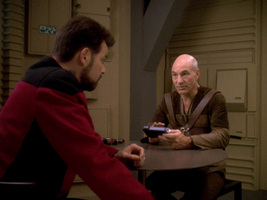
 "Gambit I/II"
"Gambit I/II"